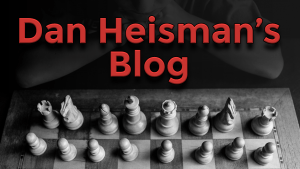Q&A with Coach Heisman Jul 11, 2014
In his fun and instructive book Grandmaster Secrets: Openings (recommended for those 1700+), GM Andy Soltis discusses in some detail why it is not necessary good, and often misguided, that average tournament and club players feel it necessary to play the openings that are currently most popular at the world class level.
I couldn't agree more.
Yet I still get plenty of questions on the show asking if some perfectly reasonable opening is OK, as if it must be condemned just because Carlsen, Anand, or Kramnik is not currently employing it in their repertoire. For example, I get asked about openings like the Bird's, a Modern, the King's Indian Attack, or the Sokolsky.
If you give various openings to a strong engine without a database, there are going to be plenty of lines that get a reasonable opening evaluation (say within -0.25 or better for Black and 0 or better for White). These would include not just the most popular lines played by grandmasters but also many common "club" openings and even very rare variations not played by pretty much anyone (yet).
You don't want to chose openings that give you clearly inferior positions but it takes a lot to lose a chess game. There are many rarer openings, and even some with dubious reputations, that are, in class-level practice, quite acceptable.
The point is that many opening sequences are playable. All the more so if you know your "rare" opening and your opponent does not.
During the show I picked up a copy of Alburt and Lawrence's Chess Rules of Thumb and read #283: "Any opening that you know sufficiently well is good no matter what its reputation." Obviously, by its inclusion in the book, it gets the endorsement from the authors, but it was a quote from an outside source. That source? Dan Heisman 
One of the openings that Soltis recommended is the tricky Riga Variation against the Ruy Lopez.
Because of a century-old Capablanca game, used in almost every opening encyclopedia that covers the Riga (curious about this line? Homework: see if you can find it!), this line is never played in grandmaster play. More recently, computers have verified that Capa's clever strategy was correct. Yet the resulting endgame from this main line, as Soltis points out, is not exactly an easy win for White.
I recommended to Howard Stern (!) that he try this "Riga" opening strategy. In total, I think Howard played the Riga in about 100 games. In none (!) of those 100 did his opponent, computer (admittedly weaker ones) or human, play the crucial Capablanca line. Yet, as Soltis pointed out, all the other lines are equal or better for Black! So at some point in the opening Howard, with Black, was at least equal, and often winning(!) The Riga can get very tactical, so in some games the computer rated Howard as clearly winning but he was not able to find his way through the complications. Still, the "Howard/Riga" experiment was a success, as it proved that Soltis' recommendation, in practice, was right on the money.
For this show we did something a little different. In order to save my voice, a friend, Rob Fusco, read the questions for me and we shared the mic. At the end of the show I asked the viewers to email me their feedback on Rob's participation: positive, neutral, or negative. As of the time of this writing, there were exactly zero emails so I guess the experiment went OK. At least we did not get much complaining on the channel that Rob was too far away from the mic, which was our main concern.
"I'm 18 and just starting serious chess. Am I too old to become a master?"
I get this kind of question quite a bit. Wetzell wrote the book "Chess Master at any Age" so he thinks you can, and others have done it, though it's not easy. Personally, I did not start tournament play til around my 16th birthday and I became a USCF expert in 3 years (it was more difficult to achieve that then, but that's a different story...). While there is only a two year difference between 16 and 18, at that age every year counts, so it's not trivial. But it would be better if we both started at 7 or thereabouts. As you get older, you have less time, more commitments, and your brain slowly gets a little less able. It's not that 18 is not a good age for the brain, but you're going to need quite a bit of learning in your 20's to get to master, and that's a bit more difficult than if you were 12.
"What kind of question would you ask Magnus Carlsen that has not already been asked?" Well, in order to answer that question, I would have to know all the questions (publicly) asked Carlsen already! That would be quite an investigative task. Since I obviously did not perform that task, I can't answer the question. But I assume all the "normal" questions like "When did you know it was inevitable that you would become World Champion?" or "Do you see the next great challenger, among the younger GMs, on the horizon?" have probably been asked more than once already  .
.
"What's a good tournament book to read so I can see both the good games and the average ones the GMs played?" Immediately someone suggested Bronstein's Zurich 1953 and its a classic. The problem is that most of these well-known tournament books assume a great deal of knowledge and are not aimed at making intermediate players better. You get a lot more out of them if you are 1900+ than if you are 1200-1700.
Alekhine's New York 1924 is a classic but I doubt it would help players in that 1200-1700 range one-tenth as much as an instructive anthology of games, such as the MacDonald series, Giddins books, or my recent "The World's Most Instructive Amateur Game Book." By the way, the latter is about learning from instructive mistakes made by players under 2200. For some reason some players when looking at the title think it's full of beginner games. It's not, and I can pretty much guarantee you will not only like it but, if you are below expert level, you will likely learn a lot more from it than from reading New York 1924  . Not because it's a "better" book - how could I claim that? - but because it's a completely different type of game book written just to help you get better; that wasn't Alekhine's intent for his book (if I may conjecture).
. Not because it's a "better" book - how could I claim that? - but because it's a completely different type of game book written just to help you get better; that wasn't Alekhine's intent for his book (if I may conjecture).
Next show will be July 25. See you then!






